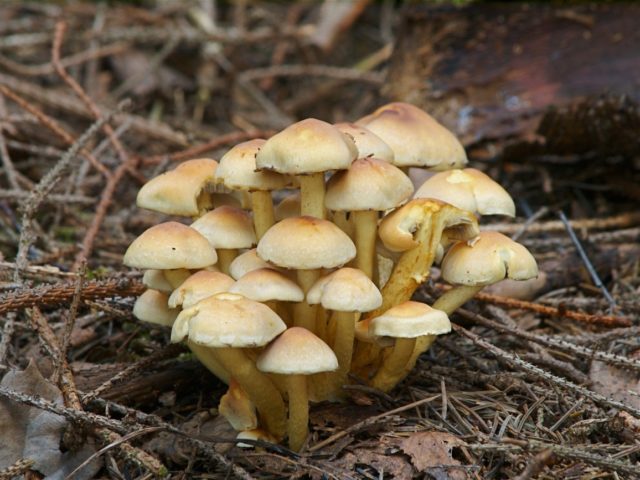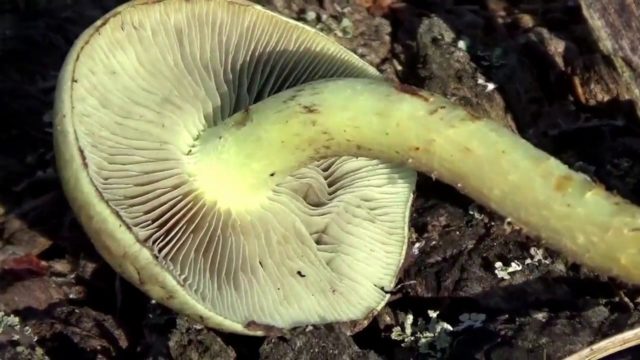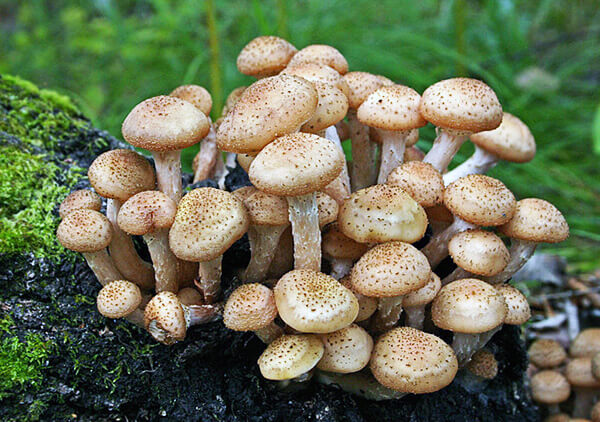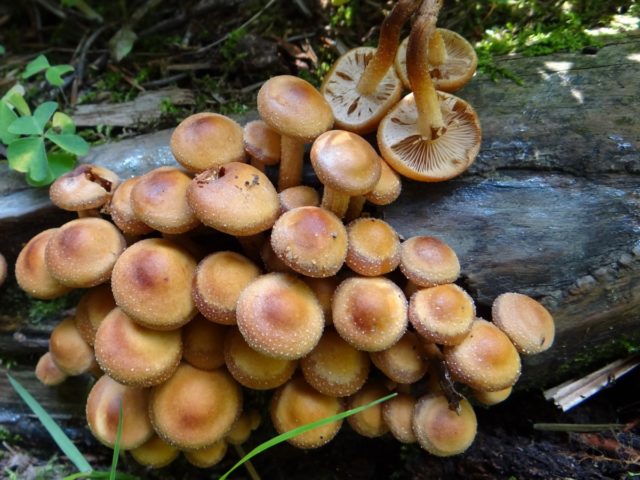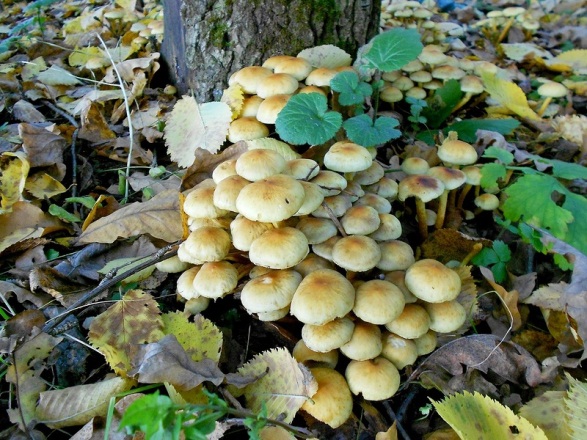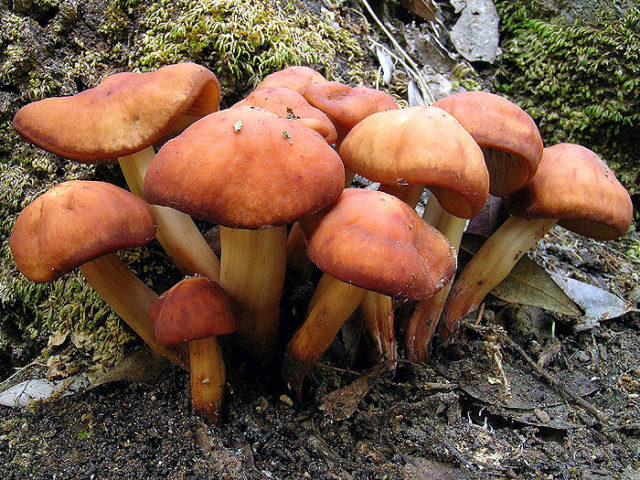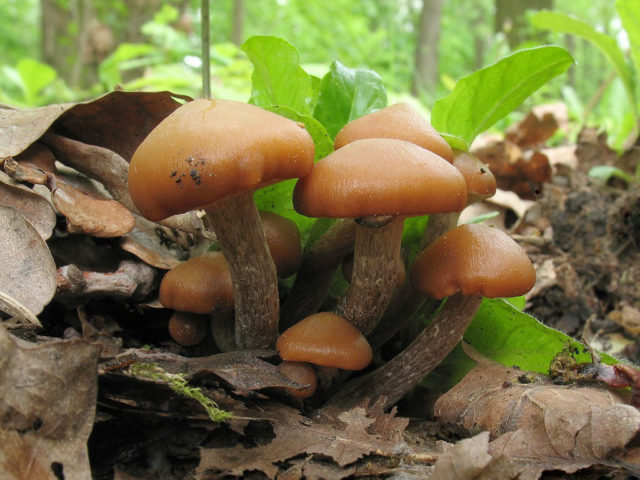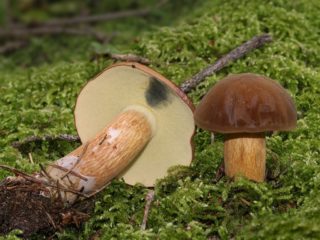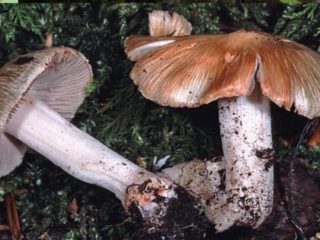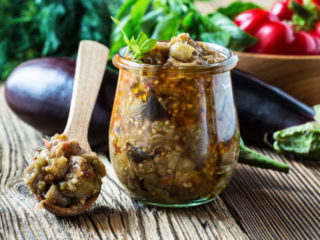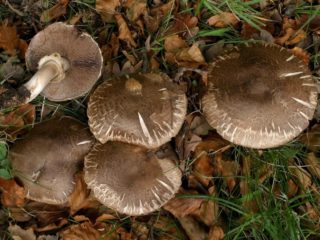Content
The false frog is sulfur-yellow, despite the name and obvious external similarity, it has nothing to do with any kind of honey agaric. It is inedible, it belongs to the Strophariaceae family. The scientific name of the sulfur-yellow false froth in Latin is Hypholoma fasciculare. It practically does not differ from edible mushrooms; it is quite difficult for an inexperienced mushroom picker to isolate it from the total mass.
Description of a sulfur-yellow false froth
It is important for the mushroom picker to know the detailed description of the false froth so as not to confuse it with the edible representatives of the species that always grow together. Their appearance is often similar, but the sulfur-yellow false fungus has several characteristic differences.
Description of the hat
The photo shows that the sulfur-yellow honey agaric has a modest, unremarkable fruiting body. It is small, with a convex (bell-shaped) cap, the size of which in a circle does not exceed 7 cm. Its color is light yellow, the crown is reddish, the edges are whitish with an olive tint. In overripe fruit bodies, the cap is flatter (outstretched) than in young specimens.
On the bottom of the cap you can see the remnants of the "blanket". The main distinguishing feature of a false mushroom is a gray, brownish blue color of the bottom of the cap, old plates, rarely - the upper part of the leg.
Leg description
Thin, even, elongated in the shape of a cylinder, rarely curved, hollow inside. In height, it does not grow more than 10 cm, its diameter rarely reaches 0.7 cm. The color varies from cream to olive, darkens closer to the bottom, becomes gray. In young mushrooms, dark remnants of a film in the form of rings can be observed on the surface; in overripe fruiting bodies, this feature is not detected.
Light or dark yellow plates of young sulfur-yellow honey agarics are adherent, in overripe fruiting bodies they darken, become purple, decomposing, acquire an ink color.
Dense, creamy, pale yellow flesh practically does not smell. The characteristic mushroom smell and other third-party aromas are absent. After a heavy rain, the mushroom may emit a slight smell of hydrogen sulfide.
The spores are smooth and oval, their powder is dark brown.
Is the mushroom edible or not
False foam (its pulp) is distinguished by intolerable bitterness. When cooked in the same pot with edible mushrooms, the fruiting body of this species also poisons them.
What toxin contains sulfur-yellow false foam
False mushrooms contain resinous substances (aldehydes and ketones). They negatively affect the mucous membrane of the digestive system. When toxins enter the bloodstream, they spread throughout the body, inhibiting the work of internal organs.
Poisoning symptoms, first aid
Dyspeptic disorders develop within 2-3 hours after the pseudo-foam enters the alimentary tract.Other symptoms: profuse sweating, fever, severe dizziness. As a result, the person loses consciousness.
Eating a poisonous mushroom, a sulfur-yellow false froth, can be fatal. It is especially dangerous for the elderly and children.
At the first signs of intoxication, nausea and vomiting, seek emergency medical help. Before being sent to a medical institution, they follow the instructions given by doctors by phone.
Where and how it grows
Sulfur-yellow false foams are often found in the north of Russia, less often it can be found in its central part. It grows on rotten stumps and near them. Prefers plant residues of deciduous trees, less often bears fruit on needles. This poisonous mushroom can also be found in the highlands. An inedible species grows from late summer to September, if the weather is warm, it can bear fruit until the first frost. Fruit bodies form large groups (families), less often single specimens of this species are found.
Doubles and their differences
There are also several poisonous and edible counterparts in the false froth. There are few differences between them, it is important to study them in detail.
Edible
Have autumn real mushroom identical with a sulfur-yellow false foil. Edible appearance light, coffee, less often cream. The skin of the cap is covered with dark scales, and there is a thin skirt on the leg.
Summer mushroom cream, or beige, with light brown spots on the top of the cap. The edible mushroom is distinguished from its poisonous counterpart by a thin wavy skirt around the leg.
The photo shows that seroplate honey fungus differs from sulfur-yellow false foam in light, cream-colored plates. Its cap is more rounded and convex. The fruiting body is higher, the stalk is thinner. On the back of the cap, you can see gray (smoky) intergrown plates.
Poisonous
Collibia fusiform, as shown in the photo, differs from the sulfur-yellow false fungus in the red, orange color of the cap. The leg of the twin is stronger, thicker, wrinkled.
Galerina bordered - thinner, graceful orange or ocher mushroom. There is a clear membrane ring on the stem of a young fruiting body, which disappears with age.
Conclusion
Sulfur-yellow false froth is an inedible, dangerous mushroom that causes severe poisoning. It differs little from the edible representatives of the species, which is its double danger. For beginners, lovers of quiet hunting, it is better to refuse to collect honey agarics if there are doubts about their edibility.
